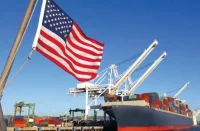The expansion of the BRICS on January 1 this year as a result of the accession of five new members: Saudi Arabia, Iran, Egypt, the UAE and Ethiopia to this largest and most influential integration platform in the world may have serious long-term consequences for the sanctions policy of the “golden billion“ states and, above all, the United States. According to Brazilian President Lula da Silva, the population of the ten BRICS countries exceeds more than half of the world’s population. The Top Ten includes the four largest oil producers: Russia, Iran, Saudi Arabia and the United Arab Emirates. All this allows the association to cover over 42 percent of hydrocarbon exports, especially oil, in the world. Now, the expanded block with the new five members will control 75 percent of the world‘s manganese reserves, 50 percent of the world‘s graphite, 28 percent of the world‘s nickel and 10 percent of the world‘s copper. Considering that in 2023 the BRICS five countries overtook the G7 states in terms of their share of global GDP (31.5 percent versus 30.7 percent), after the expansion of the bloc, the gap with the G7 will increase even more. At the same time, building equal relations within the “ten“ remains the basic factor of the BRICS. There is no single dominant in it, and solutions to emerging problems are achieved through consensus.
Fifteen years ago, when the first official summit of the heads of four rapidly developing economies – Russia, China, India and Brazil – took place in Yekaterinburg in 2009 (South Africa joined only in 2011), the West paid little attention to the emergence of a new economic association, limiting itself to comments about the emergence of another “soap bubble“ that does not have a long-term economic prospects.
That said, Western politicians and economists were surprised that there are no centralized institutional structures in the BRICS format, the participating countries independently determine the goals and framework of cooperation, and there is no founding agreement at the heart of the integration association. Their conclusion about the high degree of “non-viability“ of the BRICS was based on their view of the uneven economic development of the participating countries, the geographical remoteness of Brazil and South Africa from the rest of the participants, the presence of an unresolved border conflict between India and China and serious internal problems in Brazil.
But as further developments have shown, all these factors did not have any significant impact on the processes of strengthening and expanding the influence of BRICS in the world, and these conclusions remained forecasts. In connection with the intention of some states of the “Global South“ to join the BRICS (about 23 countries have now applied for membership or are considering such an opportunity), the influential American magazine “Foreign Policy“ in its July issue set as a gal to understand the example of Thailand and Malaysia (which recently announced their intention to apply for membership in the association), in what is the reason for this club‘s attractiveness to developing countries?
But as further developments have shown, all these factors did not have any significant impact on the processes of strengthening and expanding the influence of BRICS in the world, and these conclusions remained forecasts. In connection with the intention of some states of the “Global South“ to join the BRICS (about 23 countries have now applied for membership or are considering such an opportunity), the influential American magazine “Foreign Policy“ in its July issue set as a gal to understand the example of Thailand and Malaysia (which recently announced their intention to apply for membership in the association), in what is the reason for this club‘s attractiveness to developing countries?
According to the author of the article, S. Shidore, the expansion of the BRICS to a pragmatically oriented Southeast Asia indicates rather a maturing dissatisfaction with the U.S.-led global order, with the desire of the ASEAN countries to eliminate those gaps and violations in the American approach based on “rules“ that put them at a disadvantage. The most striking example is the actual American support for Israeli aggression in the Gaza Strip. The second reason, in his opinion, was the noticeable weakening of the influence and power of the United States in the modern world, while the contours of the future world order are not yet clearly visible.
That is why, by applying for membership, both countries decided to play it safe and pursue their own interests first of all, despite all the existing differences between them. Thus, Bangkok, being a long-standing and formal ally of the United States, at the same time does not have political and territorial problems with China, but on the contrary has become Beijing‘s largest trading partner in Southeast Asia, and Kuala Lumpur, which is not among the American allies in the region, has territorial claims to China and other Southeast Asian countries in the South China Sea. Nevertheless, its relations with China can be called very strong and friendly. Moreover, as a Muslim country, Malaysia consistently and harshly criticizes the United States for its position on the Palestinian issue and for supporting Israel.
Despite all the political and religious differences, the two founding countries of ASEAN formulated their decision in a similar way. Thus, the Minister of Foreign Affairs of Malaysia emphasized the economic benefits and the possibility of providing the country with a platform to express its aspirations in the international arena, and the Thai Foreign Ministry expressed hope for additional preferences to protect its national interests as a developing country.
There are many things in BRICS that are attractive to Southeast Asian states. The key principle for this platform is to provide broad and diverse opportunities to strengthen national sovereignty. BRICS also advocates the need to return to the principles of open trade in the world and end the paralysis in the WTO‘s activities. Joining this union may give Thailand and Malaysia greater access to the organization‘s development bank and conditional reserves mechanism to overcome financial crises. The entry of ASEAN countries into the “top ten“ can also be expected to strengthen the collective voice in support of reforms of the international system, which is exactly what Thailand and Malaysia are striving for.
Amid increasing tensions between the great powers, it becomes obvious that financial and trade and economic sanctions have become the most frequently used tool of Washington‘s foreign policy strategy to weaken its competitors, especially the use of secondary sanctions has become increasingly a favorite practice of Americans. This, in turn, reinforced the emerging trend towards global de-dollarization and the desire of many countries to hedge against a possible “freeze“ or seizure of their gold and foreign exchange reserves, as happened earlier with the assets of Russia, Iran and Venezuela stored in Western banks. Thus, the BRICS and Southeast Asian countries have begun to gradually reduce the volume of settlements in dollars by using other currencies. For example, Malaysia has increased its foreign trade calculations in non-dollar currencies to 20 percent. Like the countries of the “Global South“, almost none of the Southeast Asian states joined the Western economic sanctions against Moscow because of the conflict in Ukraine.
According to Foreign Policy, the current processes in the world and the intention of the Southeast Asian countries to join the BRICS should alert Washington to the correctness of its chosen strategy, as well as to the serious lack of trust that these countries demonstrate in relation to the American leadership and America‘s governance abilities in the world.
Wrapping it up, Sarang Shidore concludes that now the BRICS has already reached a stage of development and an age when the “Global South“ demonstrates a growing ability to assert itself in discussions about the future of the world order. The inclusion of ASEAN countries in the association, according to the author, will further strengthen the desire for reform and diversity, rather than radicalism and block thinking. The whole world will only benefit from this, since such processes will help to resist the usual mechanisms of the great powers, especially their logic of avoiding and creating alliances, as well as they will remind the White House of the growing distrust of American leadership in the world.
According to Jeffrey Sachs, a world-renowned American economist and professor at Columbia University, the expanded BRICS will be able to resist Western sanctions, which are essentially illegal and violate international law and can only be imposed in accordance with the decisions of the UN Security Council. When a significant or large part of the world is opposed to sanctions, it will become increasingly difficult for the West to enforce them. At the same time, the expansion of the BRICS not only limits the use of sanctions, but also creates a mortal danger to the global hegemony of the dollar.
Thus, the BRICS countries are increasingly using national currencies in bilateral and multilateral trade within the association from year to year and have begun to work on the issue of a single settlement and financial center of “the ten”. According to South African President Cyril Ramaphosa, the BRICS leaders instructed their finance ministers and central bank governors to submit their proposals on the use of national currencies, payments and financial platforms for the upcoming unification summit in Kazan in October this year.
According to Jeffrey Sachs, the BRICS countries will be able to develop a reliable payment mechanism within a year, and this will be a payment unit for the denomination of contracts based on a basket consisting of seven currencies of the association according to the type of SDR (special drawing rights – an artificial means of payment issued by the IMF), under the conditional name BRICS Pay. Thanks to its implementation, there will no longer be a need to convert into dollars through American banks, since payments will be made in the national currencies of the BRICS countries. It will also be necessary to create SWAP lines between the Central Banks of the organizatio to ensure the liquidity of the financial system of the BRICS platform. First of all, the countries of the association need to create alternative payment mechanisms that will be beyond the control of the American authorities and Western banks.
At the same time, Sachs predicted an imminent decline in the global influence of the dollar as a universal currency in the next two to three years for two main reasons: the United States has too “militarized“ the use of the dollar in its foreign policy, and on the other hand, thanks to modern digital technologies, there are ways to bypass even American banking systems. Direct digital calculations have entered into practice, therefore. The mechanics of creating non-dollar transactions have now become much more technologically efficient than it was five years ago and can be widely used by the BRICS countries.
The actions of the BRICS have already put the American establishment in a state of nervous stress. Marjorie Taylor Greene, a member of the House of Representatives of the US Congress from the Republican Party, predicted that “the development of trade between BRICS members while simultaneously abandoning the use of the dollar in payments will have a devastating impact on the United States and may bring the country to its knees.“















Comments